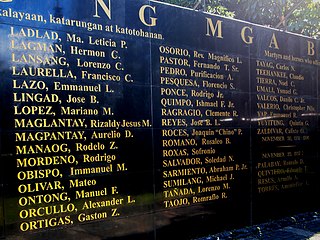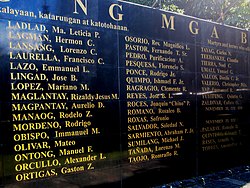
The Free Legal Assistance Group (FLAG) is a nationwide organization of human rights lawyers in the Philippines. It was founded in 1974 by Sen. Jose W. Diokno, Lorenzo Tañada, J.B.L. Reyes, and Joker Arroyo during the martial law era under former President Ferdinand Marcos. It is the first and largest group of human rights lawyers established in the nation. They work on countering varied abuses against human rights and civil liberties. Its current chairman since 2003 is human rights attorney Chel Diokno, the founding dean of the De La Salle University Tañada-Diokno School of Law.

The Bantayog ng mga Bayani, sometimes simply referred to as the Bantayog, is a monument, museum, and historical research center in Quezon City, Philippines, which honors the martyrs and heroes of the struggle against the dictatorship of former President Ferdinand Marcos.
The Bulacan Martyrs of 1982 was a group of young activists who worked together to oppose the Ferdinand Marcos dictatorship and restore democracy in the Philippines. They were meeting at a farmer's residence on June 21, 1982, when the house was raided by 30 armed soldiers from the 175th Philippine Constabulary (PC) Company. They were arrested and were found dead the following day in another town 20 kilometers away.
Jose Pacturayan Dizon, better known as Father Joe Dizon, was an activist priest in the Philippines who fought against the dictatorship of then President Ferdinand Marcos.

Benjamín Roberto "Behn" Holcombe Cervantes was a Filipino artist and activist. He was highly regarded as a theater pioneer, teacher, and progressive thinker who was detained multiple times during martial law in the Philippines.
Tullio Favali was an Italian priest who ministered in Zamboanga, North Cotabato and Metro Manila in the Philippines. He was the first foreign missionary to be murdered by paramilitary forces during Martial Law, provoking public outcry from the Vatican and Italian government. His death caused international attention to human rights violations and abuses to paramilitary forces during the Marcos dictatorship.
Antonio Ma. "Tony" Onrubia Nieva was a Philippine journalist, union organizer, and activist. He worked to defend press freedom and the rights of workers, and campaigned to end dictatorship in the Philippines. He led the National Press Club as president and founded the National Union of Journalists of the Philippines. He was secretary general of the International Organization of Journalists based in Prague, Czech Republic, from 1995 up to the time of his death in 1997. His name is on the Bantayog ng mga Bayani Wall of Remembrance, for his contributions to the fight against injustices of the dictatorship under President Ferdinand E. Marcos.
Religious sector opposition against the dictatorship of President Ferdinand Marcos included leaders and workers belonging to different beliefs and denominations.

Father Zacarias Agatep, also known by his nickname Apo Kari, was a Roman Catholic parish priest who was killed for speaking against foreign and local monopolies in Ilocos Sur's tobacco industry during the dictatorship of President Ferdinand Marcos. He has formally been honored as a hero of democracy who fought against the dictatorship, having had his name etched on the wall of remembrance of the Philippines' Bantayog ng mga Bayani.

During the presidency of Ferdinand Marcos, Filipino workers in the labor industry experienced the effects of government corruption, crony capitalism, and cheap labor for foreign transnational industries, One of the objectives of Martial Law was to cheapen labor costs, in order to attract transnational corporations to export labor to the Philippines. Marcos signed many presidential decrees beneficial only to his associates, while allowing for the forced relocation of indigenous peoples, decreasing workers' wages, and murders of labor activists. Minimum wage was a fixed PHP8.00 per day. Many workers were unemployed or underemployed. It was also during the Marcos presidency when the practice of contractualization began, enabling managements to avoid giving regular, permanent status to employees after six months of work. Strikes were banned and the government controlled trade unions, leaving workers without effective protection against employers who had unfair labor practices and regulations.
Alexander "Alex" Orcullo was a Filipino journalist, community leader, and activist known for speaking against the abuses of the dictatorship of Ferdinand Marcos, and for being a seminal figure of the protest movement against the Marcos dictatorship in Mindanao, Philippines.

Melania Cristina Catalla was an anti-martial law activist who belonged to a network of community organizations in the Southern Tagalog region in the Philippines whose disappearance on July 31, 1977, became a rallying cry of the Philippine resistance against the Marcos dictatorship.
Captain Danilo Poblete Vizmanos, PN, Ret. was a Filipino activist and retired captain of the Philippine Navy. He is best known for his resistance against the Martial Law regime of former Philippine President Ferdinand Marcos. On November 30, 2016, Vizmanos' name was engraved on the Wall of Remembrance of the Bantayog ng mga Bayani, which honors the martyrs and heroes who fought against the Marcos dictatorship.
Rogelio Concepcion Morales was a Filipino master mariner, educator, Navy captain, and activist best known for his role in the transformation of the Nautical School of the Philippines/Philippine Nautical School into the modern-day Philippine Merchant Marine Academy, and for his activism to promote the rights of Filipino seafarers, which led him to become the president of various advocacy societies and unions through the 1950s and 1960s, and to become founder of the Concerned Seamen of the Philippines (CSP) in 1983.
Mariani C. Dimaranan, also known as Sister Mariani, was a Catholic nun and activist in the Philippines who fought against the dictatorship of Ferdinand Marcos.

Ma. Violeta Marcos, AMP was a Filipino Roman Catholic nun. She was best known as the co-founder and first director of the Augustinian Missionaries of the Philippines, and for her contributions to the resistance in opposition to the martial Law dictatorship of Ferdinand Marcos - first through her diocesan social action involvements in Negros Occidental, and later as part of the human rights organization Task Force Detainees of the Philippines.
David Triunfante Bueno was a Filipino human rights lawyer and radio show host from Ilocos Norte, best known his work as the most prominent human rights lawyer in Ilocos Norte during the later part of the Marcos administration and the early part of the succeeding Aquino administration. He was a member of the prestigious group called the Free Legal Assistance Group or FLAG, the oldest and largest group of human rights lawyers in the country.

The murder of Francisco Laurella, Fernando Pastor Sr., and Fernando Pastor Jr. in Cabarroguis, Quirino on February 8, 1986, were three of numerous violent incidents associated with the Philippines' snap presidential elections of 1986. Quirino province assemblyman Orlando Dulay, who was the provincial coordinator of the Ferdinand Marcos' political party, the Kilusang Bagong Lipunan (KBL) was caught and found guilty of the murders in 1990.
Soledad Nacional Salvador was a religious worker and activist in the Philippines who fought against the dictatorship of Ferdinand Marcos.

Romraflo R. Taojo was a Filipino labor and human rights lawyer, activist, and educator best known for his work with the Free Legal Assistance Group, where he pursued human rights cases against military personnel who were implicated in torture cases. He was killed on April 2, 1985, when unidentified gunman entered his apartment in Tagum, Davao Del Norte, and shot him five times in the eyes and mouth. The gunmen were believed to be part of a paramilitary group acting on orders from the military.







